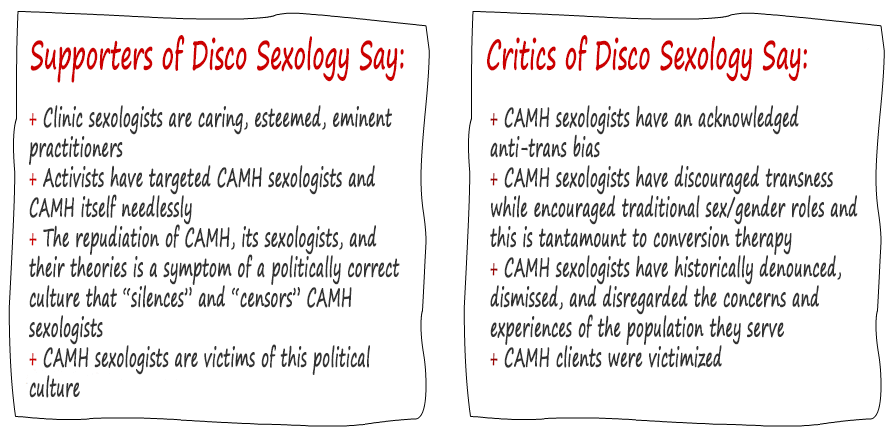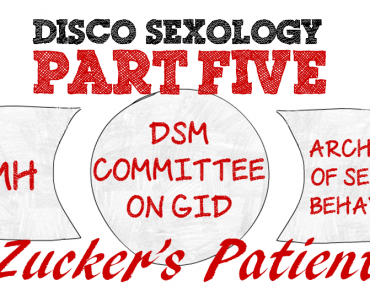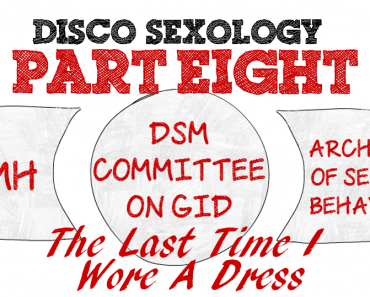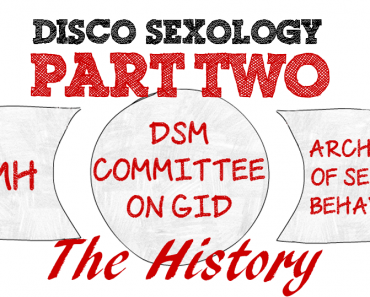By Cristan Williams
Upon completion of this series, this work will be released, in its entirety, as both an audio and ebook.
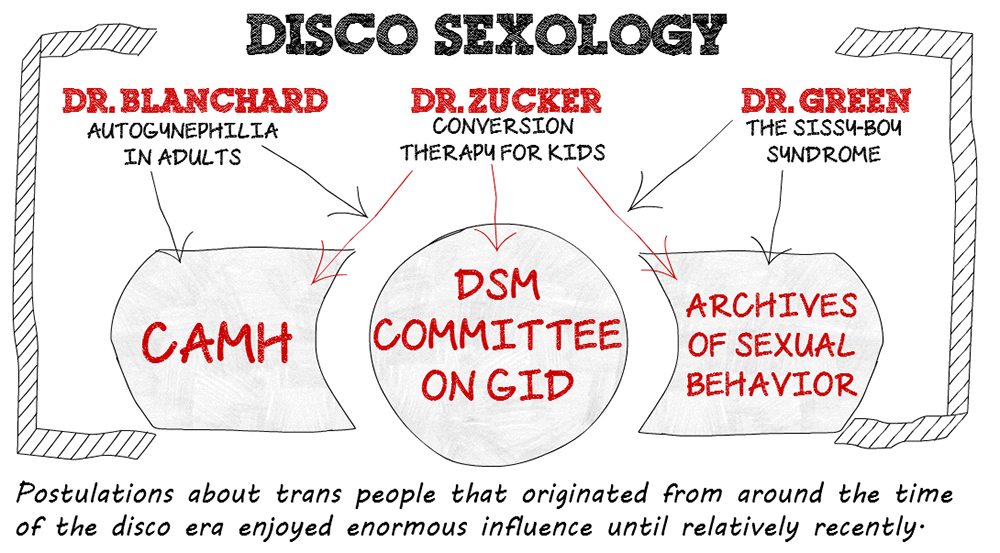

Installment Preface
Welcome to the sixth installment in this series on the rise and fall of Disco Sexology. Affirming therapeutic models offer a patient-therapist relationship wherein the patient’s gender isn’t problematized. This approach was recently criticized in a BBC documentary titled, Transgender Kids: Who Knows Best? wherein Dr. Zucker compared affirming models of care to buying dog food for kids engaging in anthropomorphic schoolyard play:
“It is possible that kids who have a tendency to get obsessed or fixated on something may latch on to gender. Just because kids are saying something doesn’t necessarily mean you accept it, or that it’s true, or that it could be in the best interests of the child.” He later adds: “A four-year-old might say that he’s a dog – do you go out and buy dog food?”
In the previous article, I interviewed a long-term recipient of Dr. Zucker’s treatment. In this installment, I interview the co-founder of the Gender Infinity Conference, recently targeted by the Westboro Baptist Church hate group because the conference focuses on an affirmative approach to trans care in youth.
This installment represents the third of five interviews I conducted with individuals intimately knowledgeable about the nuanced differences between Disco Sexology and affirmative care.

A Conversation with Gender Infinity Conference Co-Founder Colt Keo-Meier, MD, PhD
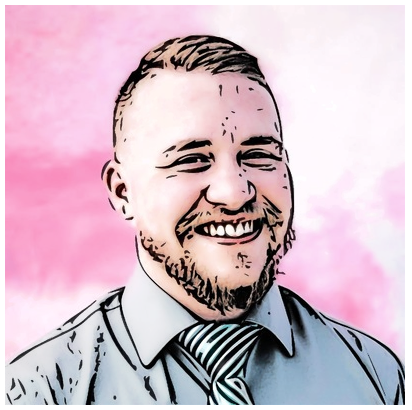
Dr. Keo-Meier is a Houston-based psychologist and medical doctor who specializes in working with sexual and gender minorities, their families, and individuals questioning their sexual identity and/or gender identity. He is a co-founder of Gender Infinity, an organization dedicated to connecting gender diverse individuals and their families with affirmative resources in the southern United States.
Cristan Williams: Would you please discuss your thoughts on Dr. Zucker’s approach to gender therapy; specifically, what are your thoughts on his approach to working with youth?
Colton Keo-Meier: Dr. Zucker’s approach is inherently trans-negative in that it is based on the premise that being trans is not an optimal outcome and in this way, his therapeutic approach is biased. This is problematic when one claims to be a gender expert while, in practice, holding the position that the optimal therapeutic outcome results in children being cisgender. It’s even more problematic when this methodology is promoted as therapy from anyone, especially at Zucker’s level.
Dr. Zucker was certainly part of the prevailing gender ‘wisdom’ until around 20 years ago when professionals openly questioned the gender claims of this type of therapy. Zucker wasn’t the only leader in this older therapeutic movement; these were mainly White heterosexual cis men– folks like Zucker, McHugh, Green, and Money. They based their therapeutic model on the belief that they held some influence over the development of gender identity, which we now know to be false.
Williams: I’ve interviewed a number of people while doing research for this story and I think that some in the trans community have a very negative view of Dr. Zucker… that he is perhaps an evil character in the story of gender therapy; someone who set out be cruel to trans people. Certainly, that’s not a view that I share; I think that he and others like Zucker did the things they did because they thought it was somehow helpful, that they were perhaps somewhat ontologically blind to the harm they were causing. Having said that, how do you view Zucker and his work?
Keo-Meier: I think that I should first tell you an anecdote that informs some of my personal views. The first time that I met him was at a 2009 WPATH conference in Norway. He came up to my research poster where I was presenting data on the fact that there are a lot of trans men who, once they transition, experience shifts in their sexual orientation; that their identified sexual orientation moved more towards a queer-identified orientation. Zucker was, of course, the head of the gender diagnoses group for the Diagnostic and Statistical Manual of Mental Disorders (DSM) and they had statements in there that claimed that it was rare and exceptional to find trans men who were attracted to other men and my research found that more than half of them were attracted to other men. So, I was excited to have him see my data of over 600 trans guys for that reason. At the time, it was the biggest sample of trans men ever presented at WPATH.
He came up to me and before he even asked me about my research –which he did look at– he said, “Can I ask you some personal questions?” I suppose I was naive in that I wasn’t at all expecting that he would approach my work in this way, so I said, “Sure.” He said, “I assume that you’re transgender?” and I said, “Yes.” He then stared at my chest and asked me if I’d had surgery and I said, “Yes.” and it just seemed quite odd that he was taking this line of questioning. For the record, I’ve never been questioned like that by any other professional or colleague. Other professionals who work with transgender people have never asked me questions about my transition because they know and have an awareness that it’s both personal and private information. So the fact is that he, in the context of me presenting my professional research at a gender conference, immediately questioned my transition status was inappropriate, crossed a professional line that other professionals wouldn’t have crossed. So, I –standing in front of my research poster at a professional conference– tell him that yes, I had had chest surgery. He paused, looked me up and down, looked at my chest and then looked back at my face and said, “But did you hate your breasts?”
I took a deep breath and explained that I didn’t hate them; it’s just that that particular part of my body didn’t match who I know myself to be. He looked at me as if he were confused by my answer and then he looked at my data and asked, “Really?” It was as if what I said to him was perplexing to him. I was deeply troubled that this person, who I was told was a supposed expert on trans people, seemed confused by a trans person’s experience of gender dysphoria. Having said that, what I did learn about him is that he was willing to look at data and his perspective can be altered with data. For instance, in the next version of the DSM-5, the false premise about the sexuality of trans men was removed and he did invite me to submit my poster as a manuscript to his journal, which I did, and which was accepted after going through grueling revisions by people who viewed the trans experience in the way that Zucker did.
So, I felt like I needed to give you that history to be able to better explain my feelings about Zucker and his approach. In terms of the professional and community-based criticisms of Dr. Zucker’s approach, there’s been significant secondary trauma reported from his approach to both patients and family. The bottom line is that he has caused harm to a vulnerable population and has yet to apologize publicly for this.
Williams: Have you worked with clients who’ve undergone reparative therapy?
Keo-Meier: Yes, I’ve had several cases like this. It should be stated that reparative (aka conversion) therapy is not only ineffective but also harms patients (see the recent SAMHSA publication). For clients who have undergone reparative therapy, the severity of distress they experience depends on how long it’s been since they had that experience and how many sessions they were subjected to. Of course, for those who were subject to that type of ‘treatment,’ they had to deal with deeply rooted transphobia, distress, self-hatred, and suicidal ideation. Also, a nuance that affects the way this ‘therapy’ impacts the client is whether they themselves sought out the treatment or if their family sent them to this treatment.
It is “therapy” that you have to go to therapy to deal with. And, honestly, we shouldn’t have therapy that you have to go to therapy to recover from. I’ve heard it described as “soul-destroying.” People internalize that there is something fundamentally wrong with who they know themselves to be and when we have providers who, on a certain level, act in collusion with that message, it increases a person’s experience of self-hatred and experienced isolation, which, in turn, increases the likelihood of a sense of lack of belonging and subsequent suicidal ideation.
Williams: But some argue that because some people detransition, that therefore proves that being trans is actually a “choice.” How would you respond to those who draw such conclusions?
Keo-Meier: I would ask them to both define and show me the peer-reviewed research of the prevalence of what they are referring to as “detransition.” These cases are very rare and we should listen to these people’s experiences.
Williams: From what I’ve seen, those types of assertions are usually made on social media by people who read something somewhere on the internet or are themselves someone who claims to have detransitioned, which proves that their experience is the experience of trans people everywhere. Mostly I’ve seen these high-profile “detransitioners” make the rounds at ideological and religious meetings and conventions.
Keo-Meier: I would never say that one person’s experience of transition then re-transition proves that millions of trans people don’t exist. I would say that transition is very nuanced and that not everyone needs the same thing emotionally, medically, or legally in their experience and expression of gender. Until recently, that is, over the past 20 years or so, the systems professionals set up for trans people meant that there was only one way to approach transition. In other words, historically, if you were going to transition, then it had to be in this one way, with these specific steps. So, I think that some of this was created by a rigid system and, moreover, some of those who de-transition do not necessarily stop identifying as trans. I also think that historically, some damage was caused by not understanding the difference between gender identity and gender expression.
So, the difference between an affirmative approach and the historical approach, for me, is that I help a client open doors that they want to explore, but I am not going to close a door on a client. For instance, if a client starts testosterone, and then decide that it isn’t right for them, we stop that and if they still want to identify as male or female or both or neither, that’s great! In other words, there’s no prescriptive or directive-driven position that a client must or should take.
Ironically, I think that’s what people fear about affirmative therapy… that it functions the cookie-cutter way therapy has historically functioned. In other words, people think “affirmative” means that we try to move people in certain directions: “Great! We affirm you so now you need to do the following things: hormones, surgery, etc.” and, in fact, that is the exact opposite of what affirmative therapy is. Affirmative therapy is client-centered and personal; its truly listening to the individual’s experience of their gender and viewing them as the expert in their experience.
Williams: That’s what I’ve seen, too. Those who write stories that tell their readers that they’re concerned that kids are being forced into systems of transition, forcing people into taking certain steps are, in fact, describing a very traditional system that became the standard in the 1970s and 80s; they’re not describing “affirmative therapy.” In fact, I recall going to a very traditional therapist decades ago who asked me how I could hope to transition if I wasn’t willing to wear high heels [laughs]!
Keo-Meier: [Laughs]
Williams: But some people are very concerned that without a Zucker-like therapist trying to move kids into more traditional gender expressions, “affirmative” therapeutic models will cause kids to, as they call it, be “transed.” Kids will be forced through systems that somehow “affirms” that gender nonconforming kids should be put through hormones and surgery when, in fact, they were gender nonconforming kids who didn’t need to transition.
Keo-Meier: A commonality that I find is that the people who are saying these things are usually people who lack clinical experience with these families. They are people who are speaking from an outside perspective that is not informed by actually doing clinical work or research with families whose kids are developing in ways that are trans or not, or gender nonconforming in expressions or not. In other words, generally these people quite literally don’t know what they’re talking about and the problem is that their uninformed opinion about this issue can create a lot of problems. It’s problematic that people who have no clinical credibility in this area are given a platform to cause undue fear in a lot of people.
When I was working on the government’s 2015 SAMHSA anti-conversion therapy statement. We were talking about affirmative therapeutic practices, and asking the question was there any research out there that showed that it’s harmful to allow kids to socially transition who want to socially transition. When a psychologist raised some of the same unfounded fears you talked about, I had to pause because they were very LGB-affirmative, but when it came to the T, they had all of these fears. There was something like 15 professionals sitting around the table and I said, “Just so I know, and I think this will help our team work more efficiently, please raise your hand if you’ve actually had any clinical or research experience whatsoever with transgender children or their families.” Of those who raised their hand, the individual who was expressing fears was not one of them.
The reality is that affirmative models take a developmental approach in children. It’s appropriate for some children to socially transition; at the same time it is important to not close any doors or push them in any direction; we follow their lead. This can be challenging to understand as typically parents do not follow children’s lead – it’s usually the other way around. But with gender health, it is a necessity.
We don’t put any medicine in children; we do not medically transition children. That’s a reality that those who promote fear around affirmative therapy generally don’t acknowledge. If there’s a medical intervention, the earliest it occurs is in an adolescent at the start of puberty in order to alleviate stress and buy time. In those situations, adolescents can receive safe medication to put puberty on pause.
Williams: Would you please talk about why you chose to develop expertise in working with trans and gender non-conforming kids. Also, would you talk about why you helped put together the Gender Infinity conference?
Keo-Meier: In my research, I found that in the overwhelming majority of my sample of transgender participants did not have any regrets about any aspect of their transition whatsoever and of the small minority who did, the most common regret they had was, “I wish I would have done this earlier.” I found that to be interesting because that’s never the “regret” that people assume in trans people.
So, that research informed my interest in working with kids and families. Adults who transition later in life and regret that they were not able to do so earlier face many, many more difficulties than those who were able to transition earlier in life. In this sense, affirmative therapy attempts to ensure that, for those who transition is appropriate, they aren’t systematically compelled to experience the regret and avoidable difficulties they would otherwise face.
While there were a number of resources for older youth and adults in Houston, there was practically no support for kids and families 12 and younger. Since our best current data suggests that gender identity development happens sometime between 18 months and 3 years of age –during the same general developmental time that we are learning how to communicate– the fact that there’s little to no support for young children was problematic.
In 2010, I wanted to develop a platform for professionals, families, and youth to network and begin developing resources; the previous year I went to a Gender Spectrum conference and they were in their preliminary years of developing services specifically for children and families. I learned a lot at Gender Spectrum in Seattle and met two psychologists that I knew from the Houston area. So, when we met back in Houston, we said to each other that we needed to start a conference like Gender Spectrum in the South, informed by our experience at Gender Spectrum. A year after is when I met Becca Keo, now Keo-Meier, and the four of us established the first Gender Infinity conference in Houston.
The name Gender Infinity was created in recognition that the gender binary doesn’t exist; that there are more than just two genders and there’s an infinite way people can express gender. What we do now at Gender Infinity throughout the year is that we have support groups for parents and children, provide consultation and training for providers and schools, and we have the annual conference, which we’ve put on for 6 years now.
Williams: How was it to have the Gender Infinity conference picketed by the Westboro Baptist Church this year?
Keo-Meier: I was surprised that we’d made it onto the radar of the Westboro Baptist Church. On one hand, I felt like, “We’ve arrived! We’re doing so much good this hate group felt they had to physically protest our work!” but on the other hand, I had a lot of concern for the children and families who were attending the conference. We wanted to minimize any sort of impact that group might have upon those who need this conference. A pastor from a local church helped coordinate a counter-protest to show attendees love and support. As it turned out, there was something like 5 times the number of supporters and none of the families had to see or deal with that hate group at all. The hate group wasn’t able to disrupt the conference at all. ⬛
What I have long said about Zucker, is that he is at heart sexist…
– Next series interview: Arlene Lev, radical feminist and pioneer of affirmative therapy

